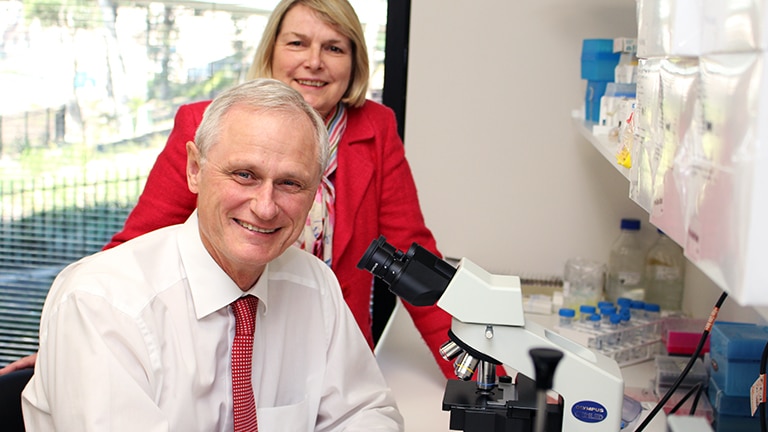
Google Scholar has confirmed that Laureate Professor Nicholas Talley from HMRI’S VIVA program is Australia’s most cited academic.

Google Scholar has confirmed that Laureate Professor Nicholas Talley, a global authority in neurogastroenterology and member of HMRI’s VIVA (Viruses, Infections/Immunity, Vaccines & Asthma) Program, is Australia’s most cited academic.
Professor Talley tops a list of 1,000 scientists from Australian institutions according to their Google Scholar Citations profiles. The researchers are ranked by h-index, which combines measures of both their productivity and citation impact.
As the University of Newcastle’s Pro Vice-Chancellor, Global Research, Professor Talley is leading the world neurogastroenterology research and is an authority on incurable functional gut disorders that affect more than one in five Australians.
His recent work linking the gut as a major driver of anxiety and other changes in the brain has contributed to a paradigm shift in the way we understand how the gut interacts with the brain. This new approach may eventually unlock new therapies not just for gut conditions, but also for intractable neurodegenerative diseases such as Parkinson’s.
Professor Talley’s ground-breaking work with Professor Marjorie Walker at the HMRI Building has led to the discovery of two new gut diseases in conditions that were previously thought to have no known cause: duodenal eosinophilia in dyspepsia, and large bowel eosinophilia linked to colonic bacteria in irritable bowel syndrome (IBS).
His other major work has identified a link between autoimmune and unexplained gut disease, which could lead to new treatment approaches. His team is investigating the role of environmental and dietary factors including wheat in causing these gut problems.
“Science shapes our world and the contributions of Australian researchers are exceptional,” Professor Talley said.
“Most research is incremental, but without the small gains the big discoveries will never happen. I’m lucky to work with a great multidisciplinary team – we take observations made in the clinic back to the laboratory to help define new disease pathways that then have the potential to lead to new tests or therapies. We’re working hard to rapidly turn our research discoveries into better treatments for patients.”
“The Nobel laureate and physicist Richard Feynman beautifully described the scientific method and his description remains a guiding principle for me: ‘If it disagrees with experiment, it’s wrong. And that simple statement is the key to science. It doesn’t make a difference how beautiful your guess is, it doesn’t matter how smart you are, who made the guess, or what his name is. If it disagrees with experiment, it’s wrong. That’s all there is to it.’”
Professor Talley is Editor-in-Chief of The Medical Journal of Australia, which holds a 5-year impact factor of 4.1. He also works as a staff specialist and gastroenterologist at John Hunter Hospital and is the author of two highly regarded medical textbooks.
He holds research appointments as Professor at Mayo Clinic in the United States and the Karolinska Institute in Sweden.
According to data collected by Google Scholar in May 2017, Professor Talley has an h-index of 155. His published work has clocked up an impressive 78,943 citations in the medical literature and his 2006 paper on functional gastroduodenal disorders, published in Gastroenterology, has been cited 2,297 times since publication.
* HMRI is a partnership between the University, Hunter New England Health and the community.
HMRI would like to acknowledge the Traditional Custodians of the land on which we work and live, the Awabakal and Worimi peoples, and pay our respects to Elders past and present. We recognise and respect their cultural heritage and beliefs and their continued connection to their land.

Hunter Medical Research Institute
We’re taking healthy further.
Locked Bag 1000
New Lambton
NSW, Australia, 2305



This site is protected by reCAPTCHA and the Google Privacy Policy and Terms of Service apply.
Copyright © 2024 Hunter Medical Research Institute | ABN: 27 081 436 919
Site by Marlin Communications
